- About
2023 Scholars
The Honolulu Chapter awarded 21 ARCS Scholar awards in May 2023 to doctoral students in STEM fields at the University of Hawai‘i at Manoa. The $5,000 unrestricted grants provide resources for professional travel, computer and research equipment and materials, and educational and personal expenses.
Two $1,000 ARCS Scholar of the Year Awards were also presented— to Katherine Ackerman (physical sciences) and Josefa Muñoz (biological sciences).
View the award presentations and candid photos from the 2023 ARCS Scholar Award Banquet.
View 2022 Scholars | 2021 Scholars | 2020 Scholars | 2019 Scholars | 2018 Scholars | 2017 Scholars | 2016 Scholars | 2015 Scholars | 2014 Scholars | 2013 Scholars | Previous Scholars
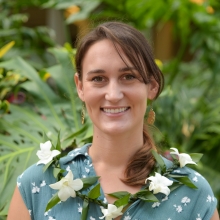 Katherine L. Ackerman
Katherine L. AckermanGeorge and Mona Elmore Award
ARCS Scholar of the Year Award
Atmospheric Sciences, Dr. Alison Nugent, advisor
VIew her videoResearch: Sea Salt Aerosol: Tiny Particles with Big Impacts on Climate
Strong winds and breaking waves send tons of salt particles into the atmosphere, yet we don't know the precise amount and environmental factors producing them. Katherine observes these aerosol particles in coastal environments to learn how coastlines contribute to their production and distribution to better understand how they impact clouds.Education: BS in geology and geophysics, University of Hawai‘i at Manoa
Interests: Cooking, running, yoga, sewing
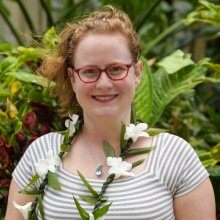 Nina P. Allan
Nina P. AllanAsteriadis ARCS Award
Cell and Molecular Biology, Dr. Alika Maunakea, advisor
View her videoResearch: Autism Spectrum Disorder, Gut Microbiome and Epigenetics
Nina has shown that maternal obesity at conception causes epigenetic changes in mice that mirror human ASD. She is exploring whether a ketogenic diet influences behavior in ASD through indirect pathways related to reduced inflammation, increased fatty acid production and microRNA gene regulation in the brain.Education: BS in biology, Haverford College
Interests: Dogs, comic books, sci-fi/fantasy
 Valentina Alvarez
Valentina AlvarezEllen M. Koenig ARCS Award
Zoology, Dr. Robert Thomson, advisor
View her videoResearch: The invasion of the brown anole to Hawaiʻi and California
Valentina combines historical and geographic data with genetic analysis of current populations to determine if the Oceania snake-eyed skink is a native species, how lizards disperse through the islands and whether Hawai‘i is a source of invasion to other Pacific locations.Education: BS in wildlife ecology and conservation, University of Florida Gainsville; MS in zoology, UH Manoa
Interests: Reading (especially science fiction), surfing, sewing, skateboarding, birding, photography
 Alexa R. Anderson
Alexa R. AndersonGeorge and Mona Elmore Award
Astronomy, Dr. Jonathan Williams, advisor
Videos: meet Alexa, view her ARCS research presentation, or watch her talk at the 2023 Institute for Astronomy Open HouseResearch: The Inner, Planet-Forming Regions of Circumstellar Disks
Alexa studies material migration in the inner regions of protoplanetary disks. She uses ground-based infrared spectroscopy data to understand and interpret lower resolution images produced by the James Webb Space Telescope. Her research may shed light on how planets form and how water may have arrived on Earth.Education: BS in astrophysics, Yale University; MS in astronomy, UH Manoa
Interests: movies, board games, cats
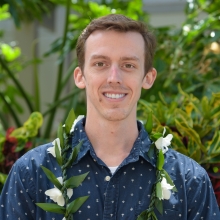 Connor W. Auge
Connor W. AugeHelen Jones Farrar ARCS Award
Astronomy, Dr. Dave Sanders, advisor
View his videoResearch: Galaxy Evolution and Active Galactic Nuclei
Connor explores how supermassive black holes at the center of distant galaxies grow as active galactic nuclei. He studies emissions across the electromagnetic spectrum for insights into the nature of the environment around the black holes. He has two accepted observing proposals as principal investigator.Education: BS in physics and astronomy, minor in mathematics, Northern Arizona University; MS in astronomy, University of Hawai‘i at Manoa
Interests: Hiking, running, board games
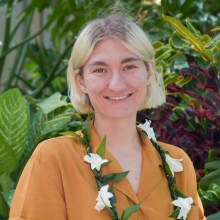 Lauren E. Braley
Lauren E. BraleyDr. Jacqueline Maly ARCS Award
Tropical Plant Pathology, Dr. Koon-Hui Wang, advisor
View her videoResearch: Papaya Ground Seed as a Biofumigant and Trigger for Induced Systemic Resistance against Soil-Borne Pathogens in Hawaiʻi
Lauren uses dried ground papaya seeds to control nematodes and fungi that reduce agricultural crop yield. The biofumigation treatment protects against a broad spectrum of soil-borne pathogens in lettuce and generates systematic immune response in zucchini without compromising soil health.Education: BS in ecology/evolutionary biology, MS in plant pathology, Washington State University
Interests: Muay Thai, cooking, comic books, sewing/crafting, gardening
 Shane J. Goettl
Shane J. GoettlSarah Ann Martin ARCS Award
Chemistry, Dr.Ralf Kaiser, advisor
View his videoResearch: Molecular Mass Growth of PAHs in Extreme Environments
Shane conducts bimolecular reactions in conditions around carbon stars to explore development of polycyclic aromatic hydro-carbons (PAHs)—organic compounds made of multiple aromatic rings that generate the raw materials for proteins and DNA. Results could explain the carbon-based chemistry of our Universe.Education: BS in chemistry with ACS certification, University of Wisconsin-Stevens Point
Interests: hiking, snorkeling, kayaking, music
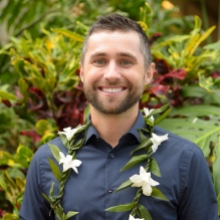 Tyler R. Goodearly
Tyler R. GoodearlyJoseph Parker ARCS Award
Nutrition–Animal Sciences, Dr. Andre Seale, advisor
View his videoResearch: Removing Barriers of Sea Cucumber Production
Global demand for sea cucumbers has caused catastrophic collapse in populations. Tyler explores use of a hormone to induce reproduction in aquaculture settings and fish ponds. He also examines the echinoderms’ response to reduced salinity and increased water temperature.Education: BS in wildlife, fish and conservation biology, UC Davis; MS in biodiversity and conservation, Trinity College, Dublin
Interests: aquaria (he has seven), snorkeling, cooking Italian, reading fantasy
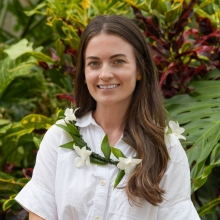 Jordan M. Gossett
Jordan M. GossettMaybelle F. Roth ARCS Award
Zoology, Dr. Rebecca Chong, advisor
View her videoResearch: Drivers of Speciation in Cave-adapted Hawaiian Planthoppers
Jordan discovered that planthoppers living in Hawai‘i Island lava tubes are a species complex and that genetic variation in the endosymbiont bacteria living inside them correlates with genetic variation in the hosts. She will use DNA sequencing to further study evolution of Hawaiian planthoppers, which form the basis of the lava tube food chain.Education: BS, MS in marine biology, University of North Carolina, Wilmington
Interests: beach days, traveling, going to new restaurants with friends
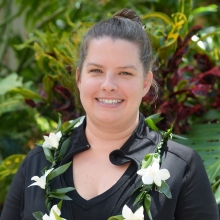 Corrisa R. Heyes
Corrisa R. HeyesBretzlaff Foundation ARCS Award
Mechanical Engineering, Dr. Joseph Brown
View her videoResearch: Multiscale Surface Force Models for Adhesive Metasurfaces
Corrisa studies nanoscale force interactions for micromechanical surfaces and the possibility that microscopic Velcro-like properties could replace solder in production of microchips. She is a 2023 Department of Defense Science, Mathematics and Research for Transformation (SMART) Scholar.Education: BS in mathematics, University of Alaska; MS in mathematics, UH Manoa
Interests: Snorkeling, stand-up paddling, reading fiction
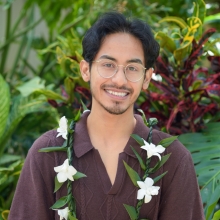 Arturo Jaime
Arturo JaimeSarah Ann Martin ARCS Award
Mathematics, Dr. Rufus Willett, advisor
View his videoResearch: Noncommutative Geometry: Spaces at Infinity
Arturo’s research lies at the intersection of mathematics born from quantum mechanics and the mathematics called topology, which studies inherent structure and algebraic data of shapes preserved under deformations. His findings related to the mathematical universal coefficient theorem (UCT) are slated for publication in the Münster Journal of Mathematics.Education: BS in mathematics, Arizona State University
Interests: hiking, snorkeling, diving, music, reading
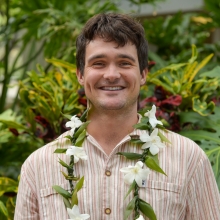 Stephen Holden Jones
Stephen Holden JonesEllen M. Koenig ARCS Award
Botany, Dr. Rakan Zahawi, advisor
View his videoResearch: Frogs and Chocolate: Amphibian Community Assemblage in Ecuador
Highly sensitive amphibians are good indicator species for impact of environmental change. Holden studies frog abundance and diversity to assess the different types of cacao production and ecosystem change in Ecuador and the impact of landscape structure on dispersal and establishment of large-seeded tree species in Costa Rica reforestation sites.Education: BS in biology, Lewis and Clark College
Interests: birding, running, biking, scuba diving, baseball, basketball, bubble tea
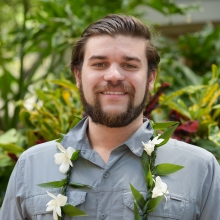 Evan M. Kelly
Evan M. KellyToby Lee ARCS Award
Earth Sciences, Dr. Shiv Sharma, advisor
View his videoResearch: Spatial Heterodyne Raman Spectroscopy for Planetary Exploration
Evan works on instrumentation for planetary exploration missions, focusing on Raman photon scattering and spectroscopy for unambiguous identification of minerals and compounds. The goal is a high-resolution instrument that is robust, lightweight, compact and reliable enough for space missions. He would like to be an astronaut.Education: BS in chemistry, Trinity University–San Antonio
Interests: all things space, traveling (he has been to every continent except Australia and Antarctica), safaris, skydiving
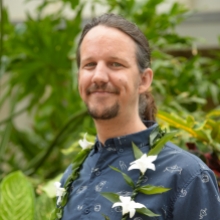 Christopher E. Ketter
Christopher E. KetterH. Keith and Sue Ernst ARCS Award
Physics, Dr. Gary Varner, advisor
View his videoResearch: Enabling Next-Generation Long-Lived Particle Detection for Beyond-Standard-Model Physics Searches at Belle II
Chris writes firmware for the K-Long Muon (KLM) detector—which he describes as “an oscilloscope on a chip”—at the SuperKEKB particle accelerator in Japan. Analyzing data to identify muons and long-lived neutral particles with greater resolution and efficiency could have implications for physics beyond the standard model and the search for dark matter candidates.Education: AS in engineering, Colorado Mountain College; BS physics, minor in mathematics, University of Hawai‘i at Manoa
Interests: Hiking, backpacking, golf, chess, learning about research in other fields
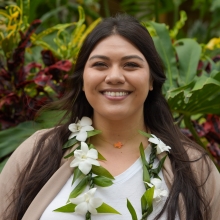 Josefa M. B. Muñoz
Josefa M. B. MuñozMaybelle F. Roth ARCS Award
ARCS Scholar of the Year Award
Marine Biology, Dr. Brian Bowen, advisor
View her videoResearch: The Love Lives of Sea Turtles: Understanding the Mating Strategies and Breeding Sex Ratio of Guam's Green Sea Turtles
Nest temperature influences the gender development of sea turtles). Rising temperatures are producing more females in most populations—as high as 99 percent on the Great Barrier Reef. Josefa tags and takes skin samples from nesting females and hatchlings to gauge feminization and resulting mating strategies and breeding sex ratios in Guam’s endangered green sea turtles.Education: BS in biology, University of Guam
Interests: learning Chamoru and Spanish, strength training, surfing, doing outreach to students
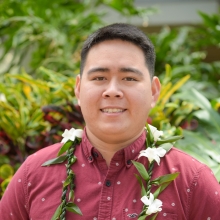 Matthew Thomas Nakamura
Matthew Thomas NakamuraFrederick M. Kresser ARCS Award
Mechanical Engineering, Dr. Joseph Brown, advisor
View his videoResearch: Data Acceleration for Materials Innovation
Matthew develops sensor systems for environmental monitoring and materials characterization, as well as advanced mechanical and electromagnetic materials with tunable properties. Interested in low-cost alternatives for big data sampling and analysis, he used off-the-shelf electronics in 3D-printed containers and web-based data storage and display for real-time monitoring of underground fuel storage tanks.Education: BS, MS in mechanical engineering, Universith of Hawai‘i at Manoa
Interests: Fishing, golf
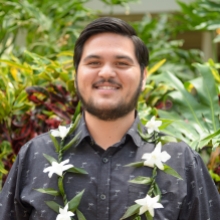 Lance Gregory A. Nunes
Lance Gregory A. NunesKai Bowden ARCS Award
Developmental and Reproductive Biology, Dr. Peter Hoffmann, advisor
View his videoResearch: Developing Mouse Models to Investigate Human Disease
Mutation of a gene encoding for a lipid synthesis enzyme has been observed in patients suffering from hereditary spastic paraplegia. Lance uses a mouse model that lacks the protein expression in the central nervous system to figure out the underlying pathology. Without the enzyme, mice had smaller body and brain mass, dysregulated lipid composition in the brain, higher amounts of oxidative damage and hypomyelination.Education: BS in molecular biosciences and biotechnology, MS in developmental and reproductive biology, University of Hawai‘i at Manoa
Interests: barbecuing/cooking, camping, volleyball, ukulele
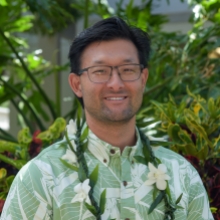 Troy K. Odo
Troy K. OdoGuy Moulton Yates ARCS Award
Tropical Medicine, Dr. Axel Lehrer, advisor
View his videoResearch: Capabilities of a Multiplex Immunoassay Platform to Characterize Antibody Responses in SARS-CoV-2 Vaccinated and Convalescent Sera
Troy develops methods to assess the quantity and quality of antibodies to determine protective immune responses to viral infection. He examined differences in antibody response to individuals who received SARS-CoV-2 vaccination and those were infected prior to vaccination. Vaccination increased antibody response in both groups; with a similar, if not stronger response in those contracting the virus first.Education: BA in biology and psychology, Claremont McKenna College; MS in tropical medicine, University of Hawai‘i at Manoa
Interests: Fitness, golfing, cooking, sci-fi/fantasy
 Anna V. Payne
Anna V. PayneColumbia Communications ARCS Award
Astronomy, Dr. Benjamin Shappee, advisor
View her videoResearch: Finding Light in the Dark: Detecting and Decoding Extreme Black Holes
Anna uses all-sky surveys and space telescopes to study the environment around actively feeding supermassive black holes at the centers of galaxies. She looks at extremely energetic events originating from existing accretion disks and when stars that wander too close get torn apart by black holes. Her findings suggest that what was thought to be a supernova may be a star revolving around a black hole. She has four projects on NASA space telescopes.Education: BA in astrophysics, BA in geosciences, Wellesley College; MS in astronomy, University of Hawai‘i at Manoa
Interests: Science fiction, film history, educational outreach, live music, knitting, gardening
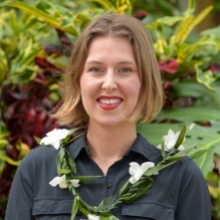 Gabrielle N. Stedman
Gabrielle N. StedmanGeorge and Marie Elmore ARCS Award
Oceanography, Dr. Craig Smith, Dr. Erica Goetze, advisors
View her videoResearch: Oh the Places You Will Grow: The biogeography of Abyssal Zooplankton
Gabrielle is describing, for the first time, microscopic animals living or and near the abyssal seafloor—one of the most biodiverse and least explored habitats on Earth. Knowing who lives there, where and why will contribute to appropriate conservation and mitigation strategies. She has secured more than $51,000 to support the research and produced reports for the International Seabed Authority that were critical in enlarging protected area coverage.Education: BS in environmental science, University of Texas at Austin
Interests: graphic art and illustration (see Instagram), surfing and swimming, long dog walks
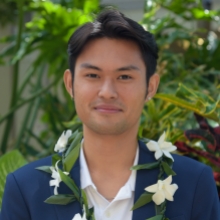 Leon L. Tran
Leon L. TranARCS Honolulu Award
Marine Biology, Dr. Jacob Johansen, advisor
View his videoResearch: Heat, Hypoxia, Humanity: Physiological and Social Resilience under Climate Change
Leon looks at changes to the metabolism of Hawaiian marine species such as reef fish and octopus under different levels of ocean warming and oxygen loss at different points in their life cycle to gauge vulnerability to climate change. He uses mathematical models to predict how his study species may respond to climate change scenarios—e.g., whether they will move to find cooler habitats—to predict the biological consequences of climate change and sustainability of human activity in the oceans.Education: BS in biology and environmental science, University of South Carolina a Columbia
Interests: Roller skating, freediving, video games, cooking
